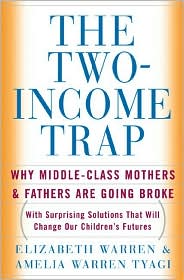The Two-Income Trap, by Elizabeth Warren and Amelia Warren Tyagi
May 5
2009

I first heard Elizabeth Warren speak in 2003 during an interview with Michele Norris on NPR’s All Things Considered. Warren appeared on the show to discuss The Two-Income Trap: Why Middle-Class Mothers and Fathers Are Going Broke, a book she co-wrote with her daughter, financial consultant Amelia Warren Tyagi. Since then, Warren—the Leo Gottlieb Professor of Law at Harvard Law School—has provided a memorable interview for the credit industry documentary Maxed Out, become chair of the Congressional Oversight Panel overseeing the U.S. bank bailout, and achieved the truest pinnacle of fame: a two-part interview on The Daily Show, during which Jon Stewart described her insights as “financial chicken soup”.
With The Two-Income Trap, Warren and Tyagi argue that a surprising number of middle-class working families are risking financial collapse. Their economic data, based on a study of 2,220 families, suggests that while a modern two-income family earns 75% more than a comparable single-income family a generation ago, today’s families actually have about 25% less discretionary income, and are much more vulnerable to economic disaster. With both parents in the workforce, modern families have committed to higher mortgage payments, moved into higher tax brackets, and purchased second cars. Unfortunately, this reliance on two incomes means that should anything happen to either partner (illness, job loss, etc.), the family no longer has enough money to cover necessities and they’ve lost the protection of having one potential worker in reserve.
A title like The Two-Income Trap is sure to raise eyebrows, but don’t worry: Warren and Tyagi are not arguing that women should hightail it back to the kitchen. In fact, they repeatedly point out that two incomes are a necessity for most families to achieve a middle-class lifestyle. Most of their suggestions focus on reform at the national level: a voucher system that would allow parents to send their children to good schools regardless of where they live, encouraging financial planning by making savings accounts non-taxable, and preventing credit card companies from charging usurious rates. Meanwhile, Warren and Tyagi encourage families to do their best to survive on one income, while spending the second on nonessential items or (better yet) saving it for a rainy day.
Frankly, this is grim stuff. Warren and Tyagi’s carefully-researched assertions are depressingly plausible, and (remember, this book was written six years ago) their concerns about things like sub-prime mortgages have already been validated. I didn’t agree with all of the points in The Two-Income Trap*, and felt that several of Warren and Tyagi’s “solutions” needed to be explored in much greater depth (the book is only 180 pages long), but the bulk of their arguments rang skin-crawlingly true.
*I don’t buy Warren and Tyagi’s statement that today’s families spend approximately the same amount of discretionary spending as families a generation ago, once adjusted for cultural norms—i.e., we spend more on computers, but less on tobacco; more on phones, but less on clothing and appliances. We might be spending less on some things than families did thirty years ago, but what was the seventies equivalent of granite countertops? Or those inflatable Christmas snowglobes people put in their yards? Or—why, God?—these?
With The Two-Income Trap, Warren and Tyagi argue that a surprising number of middle-class working families are risking financial collapse. Their economic data, based on a study of 2,220 families, suggests that while a modern two-income family earns 75% more than a comparable single-income family a generation ago, today’s families actually have about 25% less discretionary income, and are much more vulnerable to economic disaster. With both parents in the workforce, modern families have committed to higher mortgage payments, moved into higher tax brackets, and purchased second cars. Unfortunately, this reliance on two incomes means that should anything happen to either partner (illness, job loss, etc.), the family no longer has enough money to cover necessities and they’ve lost the protection of having one potential worker in reserve.
A title like The Two-Income Trap is sure to raise eyebrows, but don’t worry: Warren and Tyagi are not arguing that women should hightail it back to the kitchen. In fact, they repeatedly point out that two incomes are a necessity for most families to achieve a middle-class lifestyle. Most of their suggestions focus on reform at the national level: a voucher system that would allow parents to send their children to good schools regardless of where they live, encouraging financial planning by making savings accounts non-taxable, and preventing credit card companies from charging usurious rates. Meanwhile, Warren and Tyagi encourage families to do their best to survive on one income, while spending the second on nonessential items or (better yet) saving it for a rainy day.
Frankly, this is grim stuff. Warren and Tyagi’s carefully-researched assertions are depressingly plausible, and (remember, this book was written six years ago) their concerns about things like sub-prime mortgages have already been validated. I didn’t agree with all of the points in The Two-Income Trap*, and felt that several of Warren and Tyagi’s “solutions” needed to be explored in much greater depth (the book is only 180 pages long), but the bulk of their arguments rang skin-crawlingly true.
*I don’t buy Warren and Tyagi’s statement that today’s families spend approximately the same amount of discretionary spending as families a generation ago, once adjusted for cultural norms—i.e., we spend more on computers, but less on tobacco; more on phones, but less on clothing and appliances. We might be spending less on some things than families did thirty years ago, but what was the seventies equivalent of granite countertops? Or those inflatable Christmas snowglobes people put in their yards? Or—why, God?—these?
Posted by: Julia, Last edit by: Julianka
No new comments are allowed on this post.
Comments
No comments yet. Be the first!